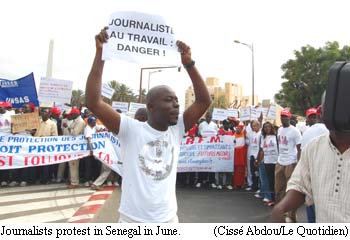Last week, the National Association of Black Journalists (NABJ) invited Senegalese President Abdoulaye Wade to speak about global climate change at its annual Unity Convention in
NABJ’s description of Wade as “a leading spokesperson for democracy and development” hardly conceals his poor press freedom record since taking office in 2000. Wade, the octogenarian leader of Senegal who endured decades of repression as an opposition leader and an ally of the press, has since presided over more suppression of independent media than his predecessors.
Ahead of Wade’s arrival, I had consulted with CPJ’s Africa program coordinator,
On July 17, I received a voicemail from Barbara Ciara. She confirmed receiving CPJ’s concerns and pledged to pass on the information to her board members. The next day, CPJ received a call from NABJ board member Tonju Francois requesting brief background notes about press freedom issues in Senegal to raise with Wade.
On July 22, NABJ’s April Yee contacted me with questions about Wade’s record on press freedom and reports of planned protests by Senegalese journalists in
When Wade’s plane finally landed, his press freedom record had preceded him, made bare by media buzz and planned protests. While in the company of American journalists, the president could not restrain his contempt for their Senegalese colleagues. Incidentally, NABJ also reported that a security officer from Wade’s Senegalese Democratic Party punched a protester who interrupted the president’s speech on Friday.
